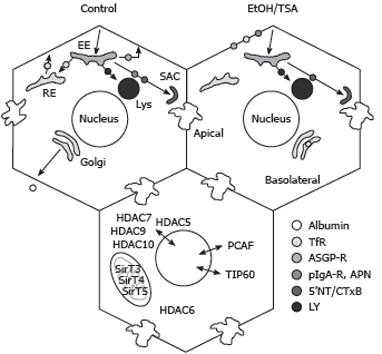Copyright
©2009 The WJG Press and Baishideng.
World J Gastroenterol. Mar 14, 2009; 15(10): 1219-1230
Published online Mar 14, 2009. doi: 10.3748/wjg.15.1219
Published online Mar 14, 2009. doi: 10.3748/wjg.15.1219
Figure 1 Alcohol-induced defects in protein trafficking can be explained by increased microtubule acetylation and stability.
Cargo internalized from the basolateral plasma membrane is delivered to the early endosome (EE) and sorted into at least four different pathways. They are recycled directly back to the plasma membrane (e.g. ASGP-R), delivered to the recycling endosome (RE) before recycling back to the plasma membrane (e.g. Tf-R), delivered to lysosomes (lys) (e.g. LY) or to the apical plasma membrane via the sub-apical compartment (SAC) (e.g. APN, pIgA-R and 5’NT). Albumin secretion is also indicated. In ethanol (EtOH) or TSA treated cells, albumin secretion and the internalization of APN, pIgA-R, Tf-R and ASGP-R is impaired whereas the fluid-phase delivery of LY to lysosomes or the raft/caveolae-mediated internalization of 5’NT and CTxB are not changed. In the lower hepatocyte, the various deacetylases and acetyltransferases that may play a role in the acetylation of nonnuclear proteins are indicated.
- Citation: Shepard BD, Tuma PL. Alcohol-induced protein hyperacetylation: Mechanisms and consequences. World J Gastroenterol 2009; 15(10): 1219-1230
- URL: https://www.wjgnet.com/1007-9327/full/v15/i10/1219.htm
- DOI: https://dx.doi.org/10.3748/wjg.15.1219









